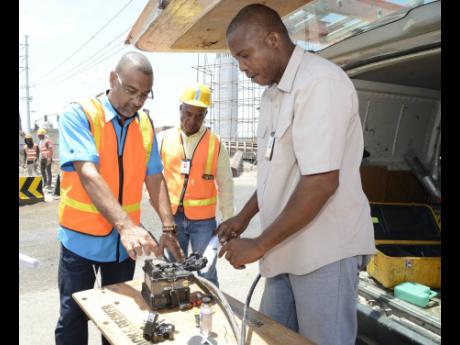Senior manager says FLOW did not have funds to readily relocate infrastructure
... as telecoms sues Gov't, CHEC over damage caused by road projects
FLOW Jamaica has denied that it had resisted the Government’s effort to coordinate with the telecoms company to relocate its infrastructure throughout the Major Infrastructure Development Programme (MIDP) in 2016.
The company also dismissed reports that its continuous delays or failure to act had significantly hampered the completion of the programme.
Maurice Simpson, civil works manager at FLOW, who is giving evidence in the multimillion-dollar lawsuit, yesterday disagreed with evidence from the National Works Agency’s senior director of project implementation, Varden Downer, about FLOW’s lack of cooperation.
Downer, in his statement, detailed numerous challenges that the NWA had experienced with FLOW, including its failure to continuously provide on-site representatives to identify its infrastructure and assist in the resolution of technical problems; provide as-built drawings of infrastructure; and expose, excavate and relocate infrastructure.
The senior manager said that while the other utility companies acted quickly in providing resources to relocate their infrastructure in a timely manner, FLOW, on numerous occasions, delayed or failed to do the same.
“As a result of the delays and the constant need for redesign of the works occasioned by Cable & Wireless; failure to act with alacrity or at all, the Government of Jamaica incurred expenses and experienced significant delays in the completion of the MIDP,” Downer expressed.
The telecommunications firm is suing the Government and China Harbour Engineering Company (CHEC) to recover millions for damage allegedly done to its infrastructure during the implementation of the programme.
The company is also seeking to recover monies that were rebated to customers when the system was down as a result of the infrastructural damage.
A contention of the Government is that FLOW had persistently failed to provide drawings of its infrastructure and to attend the various sites in the Corporate Area to identify the conduits and cables.
But Simpson, in FLOW’s defence, said the company did not have funding in place to readily remove the infrastructure.
But he said the company had shared the layout plans of existing infrastructure with the NWA and “we always make ourselves available for any excavation that may be required”.
Simpson, however, accused the Government of not providing the company with adequate notice so that it could make the necessary preparations to secure its infrastructure.
“It cannot be when you [are] ready to advance the project,” he said.
Meanwhile, during cross-examination from CHEC’s lawyer, Maurice Manning, KC, Simpson admitted that FLOW had a responsibility to uncover its assets whenever there was a conflict with the proposed works.
However, he said FLOW was not able to expose its assets in every instance during this project as several sites were being operated simultaneously and also based on the scope of the work.
But he later pointed out that while the company would act whenever a notice is served for relocation, he could not have acted to relocate the company’s infrastructure as he did not have a budget.
Despite FLOW's contention that it had not received several of the notices and in the required 24-48-hour time frame, Simpson admitted that the company had received notices for several segments of the project and had acted on them.
Simpson also disclosed during cross-examination that FLOW was affected by a lack of internal support to secure its assets throughout the various segments of the projects.
According to him, he had indicated from 2016 that approval was needed from local and international partners to remove the assets, but up to 2018, no request was officially sought.
The civil works manager further shared that at the time of the project, there were old asbestos pipes and infrastructure dating from the 1960s in the Constant Spring, Hagley Park and Three Miles segments of the MIDP.
The trial will continue today.

